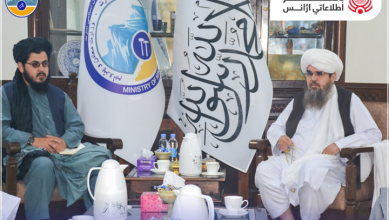
Mr. Chairman,
Excellencies,
Dear colleagues,
Ladies and Gentlemen,
First, please let me express my sincere gratitude to the Government of Peru for hosting today’s meeting and commend them for the excellent arrangements and warm hospitality.
The drug problem, and its corresponding problem of organized crime, degrades public and individual lives, undermines the foundations of sustainable development, erodes human capital, destabilizes nations, and challenges democratic institutions.
It is a major financial source for terrorism and organized crime, which is particularly harmful for post-conflict and fragile states, where it weakens the rule of law, and impedes our ability to fulfill the people’s desire for peace, progress and prosperity.
My country Afghanistan is a prime victim of the drug problem, and we pay a heavy price every day in fighting the production and trafficking of illicit drugs.
We welcome the timely and important initiative of His Excellency the Foreign Minister of Peru for hosting this high level International Conference. Based on our experiences, we feel there is an urgent need to review existing initiatives with a new vision.
Afghanistan supports the Peruvian initiative to establish an effective worldwide mechanism to exchange strategic and operational information against criminal drug organizations and the proposal to create an alliance of countries to promote sustainable development alternatives to drug cultivation.
Mr. Chairman,
The drug problem constitutes a serious challenge to the aspirations of the Afghan people for a peaceful, stable and healthy future.
The Government of Afghanistan is strongly committed and has taken specific steps on the national, regional and international levels to combat the world drug problem: by adopting laws and strengthening relevant law enforcement agencies, eradicating crops, eliminating laboratories, preventing precursors from coming to the country, fighting drug trafficking, creating an alternative opportunity for farmers and actively engaging in all regional and international mechanisms and efforts on counter-narcotics.
For the last 10 years, we have made significant progress in our fight against drug production and trafficking. For example, just last year we eradicated 1,925 poppy farms in 719 districts in 14 of our provinces.
From 2007 to 2010, our statistics show a 63 percent decrease in narcotics cultivation in Afghanistan. We have set up a special tribunal to for prosecuting individuals involved in the drug trade, which has already put dozens of traffickers behind bars. But these efforts come at a high price for us. Just last year alone, we lost 40 police officers and 92 Afghan national security personnel were injured in counter-narcotics operations.
Mr. Chairman,
This is a complex problem. The reduction of poppy cultivation in 2010 reduced the supply in international markets, causing a 33 percent rise in the price of narcotics. This caused drug traffickers and organized criminal elements to encourage and pressure farmers to increase poppy cultivation.
We must acknowledge that elimination of drug crops and reducing supply is only part of the solution. To prevent the trafficking of drugs as a lucrative economic commodity, we need to carefully consider and create an efficient mechanism to control both sides of the transaction, i.e. demand and supply in global and regional markets, combat the narco-terrorism phenomenon, dismantle the operation of drug trafficking mafia networks, address unemployment and poverty, and create a substitute livelihood through alternative development for farmers in affected countries.
The trafficking of precursors to Afghanistan to convert opium into heroin and morphine is a major example of exacerbating factors in the Afghan drug problem that comes from outside our borders. This must be stopped.
Afghanistan does not produce any precursors and has banned the import of most types of precursors to the country. But every year, more than 470 tons of precursors flow into Afghanistan illegally, in particular Acetic Anhydride, which is one of the indispensable precursors for heroin production. The proper management of the production, distribution, and consumption of these chemicals plays a critical and vital role in fighting the global drug problem.
Lack of security in some parts of the country due to terrorism, and the strong nexus between opium cultivation, terrorist groups, and the mafia trafficking networks that benefit from the drug trade are key drivers of drug production in Afghanistan. According to reports, the Taliban benefit from the drug trafficking at a scale of over $155 million per year. Narcotics production and trafficking is one of the main financial resources for terrorism, and we need a comprehensive approach to fight both of these problems.
Mr. Chairman,
Afghanistan actively has participated in all bilateral, trilateral, regional and multilateral mechanisms and initiatives against drug problem. Since November 2011 there have been further milestones, including the Istanbul and Bonn conferences. The Istanbul Process, followed by the first follow-up ministerial meeting to it titled “A New Agenda for Regional Cooperation in the ‘Heart of Asia’ recently convened in Kabul on 14 June 2012, has been an important development with its focus on confidence-building measures between the Heart of Asia countries.
Counter-narcotics is a key element of this new agenda for building greater confidence and advancing result-oriented cooperation in our region. We plan to work closely with our regional partners to focus on countering the production, trafficking and consumption of opium and other narcotic drugs, and to address the trafficking of precursors to prevent illicit cross-border movement of personnel and material.
Afghanistan is also actively participating at the international level and closely working with international institutions and UN agencies in the global efforts against the drug scourge.
The UNODC country program for Afghanistan 2012-2014 includes strengthening the Criminal Justice system, and increasing counter-narcotics efforts and the capacity of the Government of Afghanistan. This is a crucial part of our efforts, especially because of the negative impact of three decades of conflict on our rule of law and justice systems. The partnership with the wider UN community through UNDAF, the Integrated Strategic Framework as well as the UN Regional Program for Afghanistan and its neighbors reflects the important role played by all agencies in the UN system, in particular UNODC, for building capacity and coordinating regional counter-narcotics efforts based on national needs.
Mr. Chairman,
In conclusion, as recognized in the 2009 Political Declaration and Plan of Action on International Cooperation for the Comprehensive and Balanced Strategy to Counter the World Drug Problem, the illegal production, manufacturing, trafficking, and consumption of drugs continue to pose a serious threat to global peace and stability.
Based on our experiences, as a prime victim of drug and organized crime, I would like to re-emphasize that as long as the trafficking of narcotics and the parallel danger of transnational organized crime pose a threat to our global stability, we cannot rely on individual countries’ efforts alone. The drug problem has become a global issue that needs global action, strong political commitment, and effective planning, mobilization and coordination by all States, the UN system, and international and national civil society organizations.
Therefore, measures need to be taken by all countries, based on the shared responsibilities to fight world drug problem. Afghanistan is committed to do its part and we hope for the success of today’s timely initiative in this direction.
Thank you for your attention.




